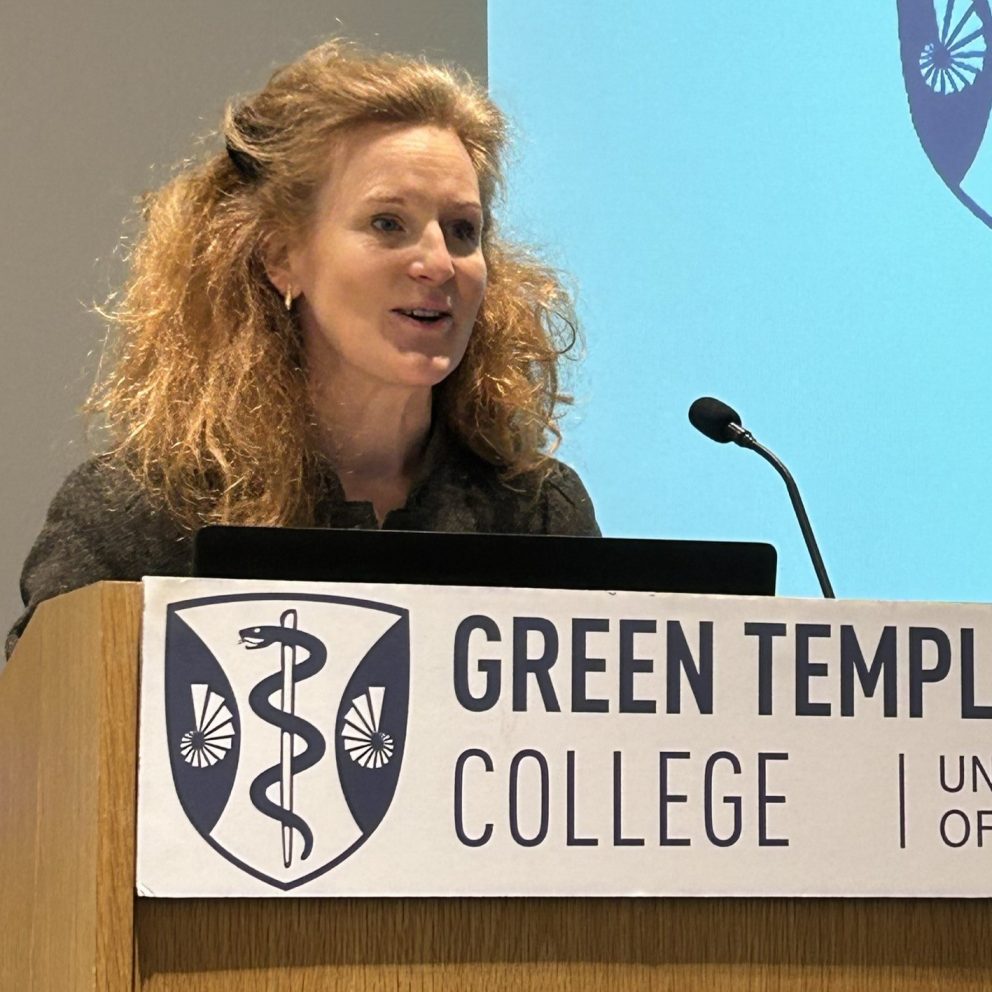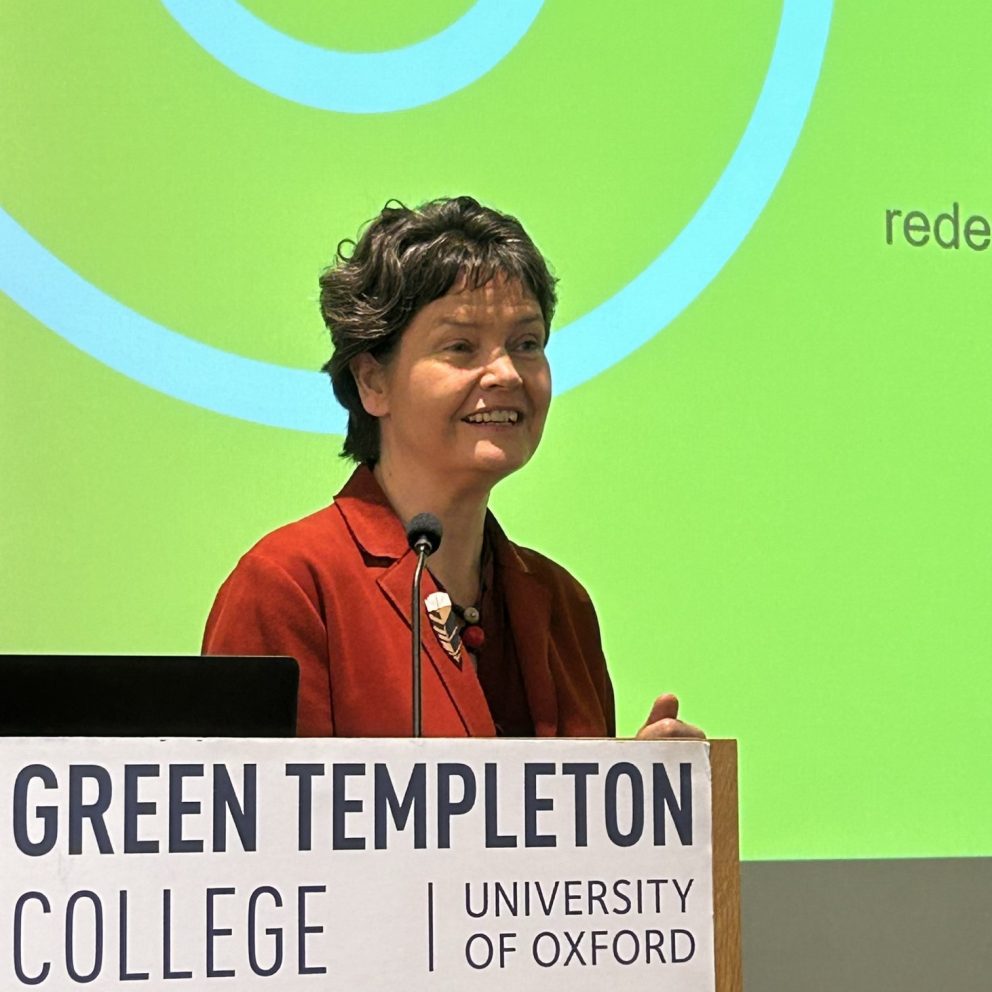Catherine Howarth and Kate Raworth on Planetary Health beyond growth
The second of the Green Templeton Lectures 2024 was held on Thursday 15 February. It was introduced and moderated by Dr SanYuMay Tun.
Read the report of the lecture
Michael Wallace (MSc Nature, Society, and Environmental Governance, 2023) writes
What should be the role of finance and economic systems in shaping planetary health? ShareAction CEO Catherine Howarth and Doughnut Economics creator Kate Raworth each shared their thoughts on this question. They agreed that the current global economy – with its orientation toward profit and growth – has fallen short of supporting Planetary Health and human wellbeing. The world has transgressed six of the Earth’s nine planetary boundaries, including climate change and biodiversity loss.
Still, Howarth and Raworth suggested that a course correction is possible. Financial institutions can push the world’s largest corporations to end practices that are particularly harmful to people and planet. Businesses can look beyond maximising financial returns to develop business models that are regenerative and distributive by design. Both, they argued, will be necessary to promote Planetary Health while continuing global development into the future.
Catherine Howarth: Impact in institutional investing
 Howarth began by taking stock of the current state of the environment and of global population health, described her path from community organising to shareholder activism, and closed by offering several proposals for reform to move institutional investing in the right direction.
Howarth began by taking stock of the current state of the environment and of global population health, described her path from community organising to shareholder activism, and closed by offering several proposals for reform to move institutional investing in the right direction.
Even setting the impacts of climate change aside, Howarth argued, a simplistically growth-oriented economy has wreaked havoc on the environment. Air pollution is one of the largest threats to public health and global life expectancy. Excessive pesticide use has contaminated fragile ecosystems and contributed to widespread biodiversity decline, putting at risk future food security and human health. Inequality within the food system leads to higher rates of obesity and uneven access to nutritious meals. These are all challenges that the growth economy purports to be able to solve – but rather has exacerbated.
In 2022, these contradictions led The Lancet’s series on the commercial determinants of health to call for a reevaluation of the growth paradigm in neoliberal economics, citing its negative impacts on people, especially people on lower incomes. How might investors play a more active role in shifting companies towards business models that reduce environmental harms and protect public health?
Howarth first encountered the power of investors to shape corporate behaviour as a community organiser for The East London Citizens Organization (TELCO) in the early 2000s. She advocated for the National Health Service (NHS) trusts and Canary Wharf based banks like Barclays and HSBC to pay their outsourced cleaning staff a London Living Wage instead of the national minimum wage. The banks initially refused, arguing that the market alone should set wages. By purchasing just five shares in HSBC, Howarth and allies in the local community, including the workforce of cleaners, gained access to shareholder meetings and lobbied the bank’s directors to adopt the London Living Wage. Barclays saw an opportunity to outdo HSBC and adopted the Living Wage. HSBC soon followed.
At TELCO, Howarth found that competition between corporations could drive a positive race to the top, depending on the pressures brought to bear. Owning shares, moreover, could open new conversations and possibilities for enacting change. This realisation led her to seek election as a trustee of her pension fund and, later, the to apply to work for ShareAction, a charity committed to the promotion of responsible investment practice, not least through shareholder activism.
As CEO of ShareAction, Howarth has developed a model for institutional investors to drive positive environmental and social change. Last week, for instance, ShareAction coordinated a group of large investors in Barclays to press the bank to announce that it would no longer finance new oil and gas projects. This is a victory but not the end of the fight. Bank financing of oil and gas – including fracking – remains common.
Given the success of this model, why don’t more investors use their power to push companies to operate sustainably? Howarth identified two barriers faced by pension funds and asset managers: how they perceive their fiduciary duty and their own governance structures. Howarth argued that the definition of an investor’s fiduciary duty should expand to include consideration not only of financial returns but also of health and wellbeing as essential components of wealth. Alongside this, pension funds should change their governance structures to give their own members a voice in how their assets are invested. A more expansive and participatory model of institutional investing, Howarth concluded, would enable the type of activism championed by ShareAction and drive the uptake of truly sustainable investments.
Kate Raworth: Transforming businesses
 Following Howarth, Raworth used the doughnut model of economics to show how businesses can and must be part of the transition toward a more sustainable economy. According to the doughnut model, the economy should promote human development without exceeding the planet’s environmental limits. To do this, businesses need to be designed to be in service to this goal.
Following Howarth, Raworth used the doughnut model of economics to show how businesses can and must be part of the transition toward a more sustainable economy. According to the doughnut model, the economy should promote human development without exceeding the planet’s environmental limits. To do this, businesses need to be designed to be in service to this goal.
How can the world facilitate global development without pursuing endless growth even in the richest of nations? Many high-income countries still see the growth paradigm as the solution to their domestic problems, and the route to international influence. Surprisingly, Raworth argued, the most ‘developed’ countries in the world – countries that have been enriched thanks to a century of significant economic growth – are actually performing the worst in relation to the doughnut model’s ecological goals. All high-income countries are exceeding Earth’s planetary boundaries while most still fall short of meeting some of their citizens’ basic needs. This problem will not be solved by doubling down on growth. It demands a deep change in economic mindset, coupled with a multi-faceted rebalancing of power between the Global North and Global South.
When it comes to the role of companies, change begins with the fundamental purpose of business. In the not-distant future, Raworth predicted, it will be normal to question a company’s right to exist if the company’s operations are not aligned with social and ecological flourishing. The most successful businesses will be those that transform degenerative practices into regenerative ones by selling products that can be reused and repaired repeatedly – as an example, Raworth applauded Fairphone, a company that designs modular cell phones with easily replaceable parts. Companies must also move away from divisive economic systems and toward distributive ones, sharing value with everyone involved in the process of production.
Achieving this change may not be easy, Raworth acknowledged. For many companies, developing a regenerative and distributive business model can seem impossible. Raworth described conversations with business leaders who, despite voicing their commitment to sustainable business models, felt trapped by the possibility of long payback periods, high capital expenditures, and mainstream financial expectations. Businesses have the technology and the strategy, Raworth concluded, but they are held back by the outdated design of their very enterprise, focused on maximising financial returns to financial investors.
Raworth noted that sustainable businesses must align their own deep design with their product ambitions, across five design traits: purpose, networks, governance, ownership, and finance. Often, however, inherited models of ownership and finance prevent companies from pursuing more sustainable business models. Raworth described how disagreements among the shareholders of Unilever undermined its sustainability goals and nearly resulted in a hostile takeover in 2017. In this context, she considered the potential for new public policy instruments to support business transformations.
Raworth ended the lecture by wondering whether there are ways to build new financial systems or investment strategies that might enable businesses to meet all five design traits. Can businesses be purpose-driven, collaborative, and generative, or will they always be constrained by the financial pressure for growth?
Remaining Questions
Together, Howarth and Raworth inspired a lively and engaging conversation. Several questions lingered in the lecture theatre. How can purpose-driven businesses measure and demonstrate results? How might artificial intelligence challenge growth-based economics? How can universities change the field of economics education to emphasise the fragility of planetary boundaries and the impossibility of perpetual growth? What support might Howarth and Raworth offer to early-stage entrepreneurs hoping to follow the doughnut model? Are large public companies capable of getting within the doughnut?
Planetary health is a generation-defining challenge that is only now receiving the attention it deserves. The exchange of ideas between Howarth and Raworth was both an inspiring demonstration of what is possible and a reminder of how much remains to be done. Their message was fundamentally interdisciplinary. Financial institutions should not be silos accessible only to economists. Instead, they have the potential to become active and democratic forums for shaping the future of responsible business and the planet.
About the series
This reports from the second of the flagship Green Templeton Lectures 2024 on Planetary Health. Read report of the first with Jo Paisley and Richard Barker on Planetary Health and financial stability
The series is considering intersections with the stability of financial systems, economics beyond growth, and the legal process. The lectures are convened by Research Fellow Dr SanYuMay Tun together with Governing Body Fellow Dr Marc Thompson and Research Fellow Dr Laurence Wainwright.

